A Board of Supervisors vote on Tuesday that will at least temporarily block a 495-unit housing complex on a South of Market parking lot has become a flashpoint for long-simmering frustrations around the slow pace of housing development in San Francisco.
The proposed building at 469 Stevenson Street would include 24% affordable units and was approved by the city’s planning department in June. But after the decision was appealed by an affiliate of the Tenants and Owners Development Corporation (TODCO), a politically powerful affordable-housing operator, the Board of Supervisors rejected the developer’s environmental impact report, effectively delaying the project indefinitely.
The reasons cited—including shadows over Mint Plaza and supposed earthquake risks—struck critics as cynical excuses.
“If you’re wondering how we got into our housing crisis, this is how,” fumed Mayor London Breed on Twitter. “Supervisors raised vague concerns about gentrification and possible shadows to justify rejecting the analysis of the experts at the Planning [Department]. This was in a hearing over supposed environmental concerns. We’re talking about a parking lot in SoMa surrounded by high-rises.”
Only Supervisors Catherine Stefani, Ahsha Safai and Matt Haney—who represents District 6, the site of the proposal—voted to move the project ahead.
For many local politicians, housing advocates and business leaders (opens in new tab), the vote—and the hours-long discussion preceding it—encapsulated the systemic issues behind San Francisco’s housing crisis.

The developer behind the project is Build Inc., a group with several other mixed-use projects in the works in and around SOMA. The Yerba Buena Neighborhood Consortium, a TODCO affiliate, appealed Build Inc.’s environmental review to the full Board of Supervisors. The process which allows this kind of appeal on individual projects is itself seen by pro-development groups as a major impediment to more housing construction.
While the hearing was supposed to be about the environmental review, supervisors aired unrelated grievances such as concerns about high rents and gentrification. Supervisors Connie Chan and Dean Preston called the developer’s environmental study “biased” and voted to reject it. TODCO president John Elberling, in a telephone comment at the meeting, vented that a package of community benefits provided by the developer was weak.
San Francisco stands apart from other California cities in how long it takes to get approvals for housing development: A study by two researchers at the University of California at Berkeley found that the median length of time to get the required entitlements was 26 months in San Francisco, the longest time frame of any city included in the analysis. By comparison, median time frames were 17 months in San Jose, 16 months in Santa Monica and 13 months in San Diego.
In San Francisco, rejections and appeals at the discretion of the Board of Supervisors afflict even smaller housing developments: Just weeks ago, the supervisors unanimously rejected a 316-unit development in the Tenderloin, earlier authorized by the Planning Department, over supposed concerns that it would become a “tech dorm” (opens in new tab)instead of family housing. The project’s authorization had been appealed by Tenderloin Housing Clinic, a major operator of single-room-occupancy units in the area.

For the Stevenson Street project, forcing the developer to conduct another environmental review—a legal requirement under the California Environmental Quality Act—could tack on a year or more to the project and, according to some housing advocates, and may violate state law.
State Sen. Scott Wiener, who’s particularly active on state housing issues, rebuked the Board of Supervisors’ determination as arbitrary and said it “probably” violated state accountability laws around new housing development.
Under the state’s Housing Accountability Act (opens in new tab) (HAA), projects that conform to a city’s existing zoning standards must be approved if they have no adverse health, safety or environmental impacts that can’t be mitigated. In the case of 469 Stevenson, Build Inc. had also taken advantage of a state density bonus that relaxes requirements for projects that meet a certain density threshold.
In a letter, YIMBY Law, the legal arm of the pro-housing group Yes In My Backyard (YIMBY), argued that rejecting the project would amount to a violation of the California Environmental Quality Act (CEQA) under HAA. Sonja Trauss, YIMBY executive director, wrote that the “city has not identified any health and safety impacts that cannot be mitigated” and thus cannot legally deny approval of the project.
Asked by Here/Say what its next steps are, Build Inc. declined to comment. YIMBY Law, which advocated in favor of the Stevenson project, said it was studying possible legal remedies in light of the Board of Supervisors’ Tuesday vote.
Shortly after the vote on Tuesday, the group released an open letter (opens in new tab) on Twitter outlining the legal argument for suing the city should it not comply. The group argues that denial of the project based on CEQA would in fact be a violation of CEQA under the Housing Accountability Act.
The imbroglio over 469 Stevenson “reveals how much of a problem we have” in state housing laws, added Chris Elmendorf, a law professor at the University of California at Davis who specializes in housing policy.
“When a project is stuck in the CEQA eddy, there is no established way to get it out,” he said.
It may take further revisions to California law or court challenges of housing delays to change the status quo in San Francisco.
“What anyone on the outside would say is: ‘This is absurd what the city did, and a court should order the project approved,'” Elmendorf said. “But that remedy is not one that courts traditionally give.”
Editing by Jonathan Weber.
